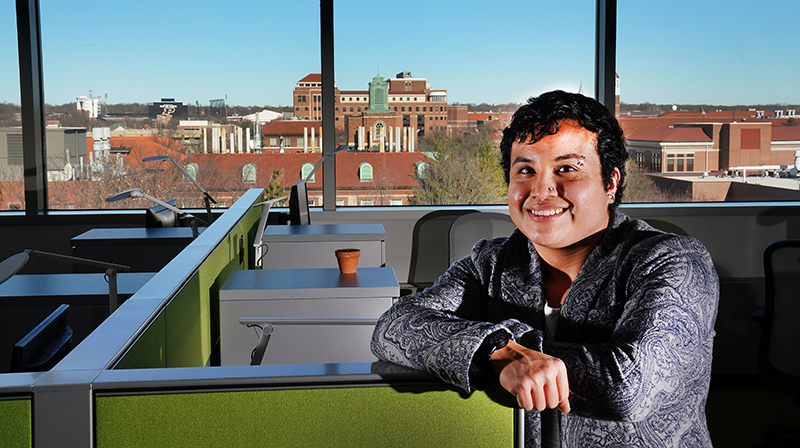The student
Growing up in Dos Palos, California, in the agriculturally rich San Joaquin Valley, has influenced Val Schull’s academic path and career goals. “There were constant concerns about droughts,” they say. “My father is a farm worker, and they’re the ones who will be severely impacted by climate change. If farm workers couldn’t work, they couldn’t provide for their families.” The first-generation college student was double majoring in biological engineering and natural resources at Cornell University when a professor encouraged Schull to apply to Purdue based on their research interests. Schull earned a master’s degree in agricultural and biological engineering at Purdue in 2017 before staying on for doctoral study with the same advisor, Margaret W. Gitau, associate professor of agricultural and biological engineering. Gitau “has been extremely supportive through both my master’s and PhD,” Schull says. “I’ve been pushed to make sure I am thinking outside the box and creatively, and to be a better problem solver. And my writing has progressed significantly.” They will complete their degree by August.
The research
Schull is a programmer and hydrologist whose research focuses on water resource management using a food-energy-water nexus framework. Their work is piloted in the Matson Ditch Watershed in northeast Indiana, consisting primarily of agricultural production of corn and soybeans to assess how crop production impacts water quality and quantity. A second aspect of the research looks at the watershed on a finer scale, using data from 2006 to 2012 to project climate change and greenhouse gases impacts at the end of 21st century. “When we’re talking about decision making and resource management, it’s important to bring together experts and stakeholders – researchers, farmers, environmentalists, producers of chemical inputs, and consumers,” Schull says. “We need to provide information everyone can understand.”
Opportunities
Schull was a member of the Sustainable Food Energy Water Systems National Science Foundation Research Traineeship program from 2018 to 2020, which they say strengthened their ability to communicate across disciplines. A past president of the Latinx Graduate Student Organization, they are the Diversity Officer on the Executive Board of the Purdue Graduate Student Government and worked in combating food insecurity, through their participation with the Latino Cultural Center’s Jardin Semillas community garden. They are a 2020 LATinE: Latinx Trailblazers in Engineering Fellow. These interactions with people and ideas, they add, “provides new narratives that come forward that spark great research ideas and proposals.
Future plans
Schull’s career goal is to join a university faculty where they can continue to do research while empowering students from marginalized communities who have interest in water quality modeling and sustainable farming research. They hope their research will influence policy and governance to promote environmental justice. Away from their computer, Shull enjoys urban gardening and training for competitive powerlifting. Lifting tremendous weight in one smooth motion isn’t unlike completing a PhD, they say: “Results take time. You need to prepare. You need a lot of practice and guidance, and a support network to motivate you.”
